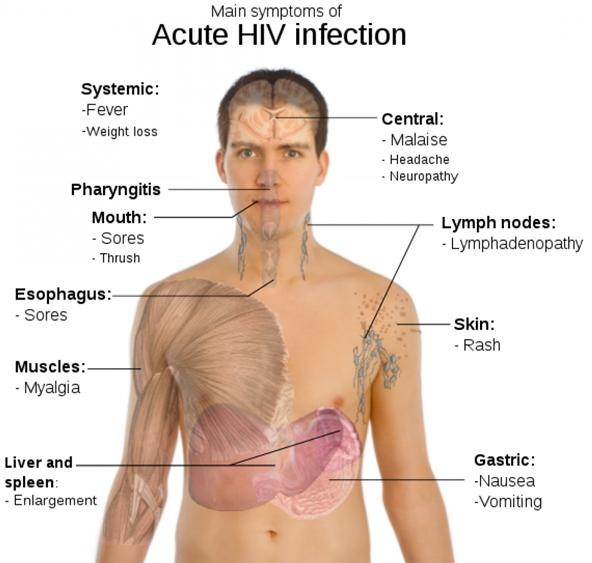AIDS: Acquired Immune Deficiency Syndrome
AIDS stands for Acquired Immune Deficiency Syndrome. Each word can be explained as:
Acquired: It means that you can get infected with it.
Immune Deficiency: It specifies the weakness of body's immune system.
Syndrome: It is group of health problems that make up a disease.
AIDS is a disease of human immune system caused by infection with human immunodeficiency virus (HIV). The initial symptoms of this disease may be a brief period of influenza like illness. AIDS is a disease which may be continued a prolonged period without any symptoms. As the infection progresses, it interfere more and more with immune system and makes the infected person so weak to get susceptible to common infections like Tuberculosis, tumors and other general infections.
The HIV virus attacks on the T-cells in the immune system and makes your body so weak that it can be easily affected by bacteria, virus and fungi. In starting weeks, it can show symptoms like headache, fever, sore joints and muscles etc. AIDS is the extreme condition of this infection. When the infection spread, it attacks on the human immune system making it harder to fight with diseases even normal infections.
Stages of HIV
The HIV infection is divided into three stages;
- Acute HIV Infection
- Chronic HIV Infection
- AIDS/ Advanced Infection
Acute HIV Infection: This is the first stage of HIV infection. Generally, the symptoms of HIV infection do not appear instantly after the infection. So, people don?t know right away when they are infected with HIV. It takes around two to four weeks for the initial symptoms of HIV to appear. This stage starts when the symptoms of HIV start appearing. This stage is also called primary HIV infection or acute retroviral syndrome. The flu-like sickness which is a main symptom in this stage is known as acute HIV infection.
Chronic HIV Infection: This is the second stage of HIV infection. In this stage, the immune system loses battle with HIV and the flu like symptoms disappear. The other symptoms may take months or years to appear. Doctors call this stage asymptomatic or clinical latent period. In this stage, the virus starts replicating in the body that gradually weakens the immune system. You may not look or feel sick, so there are chances that you can pass HIV to others. So, the early testing for HIV is very important, even if you are feeling fine.
AIDS/Advanced Infection: This is the third and advanced stage of HIV infection. In this stage, your CD4 T-cell number goes below 200 and your immunity decreases drastically that make you more susceptible to opportunistic infections.
Reasons of HIV infection
Aids can be transmitted from person to person in many ways:
- By unprotected intercourse with infected person
- By Blood transfusion
- From mother to a child (By birth), it can also be spread by breastfeeding
- Through oral sex, in some cases it can possible by deep kissing
- By the use of hypodermic needles
Symptoms of AIDS
Aids can be transmitted from person to person in many ways:
- Rapid weight loss
- Recurring fever or extreme night sweats
- Sore throat
- Extreme tiredness, Muscles and joint pain


0 comments:
Post a Comment